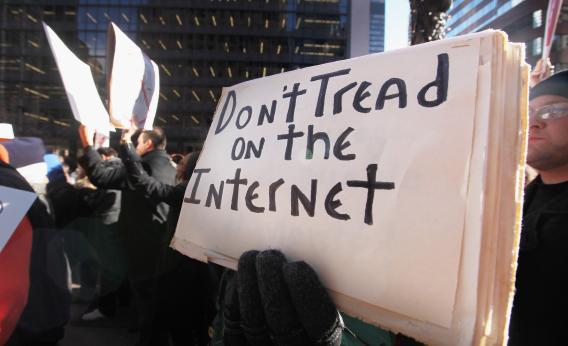Online calendars are filled with holidays celebrating chocolate candy and talking like a pirate. But today’s unofficial celebration is worth observing—not because it signifies a battle won, but because it reminds us of what remains to be done.
Internet Freedom Day commemorates the anniversary of last year’s Internet blackout to protest the controversial Stop Online Piracy Act. On Jan. 18, 2012, thousands of websites—including popular user-driven sites like Wikipedia and Reddit—“went dark” to demonstrate how the proposed copyright legislation could enable online censorship. Others replaced parts of their home pages with information about the legislation, its potential impact on free speech, and ways for ordinary Internet users to mobilize in opposition.
Although advocacy efforts to prevent SOPA’s passage (along with that of its Senate counterpart, PIPA) had been going on for months, that was when the movement crossed over into the mainstream. In the span of a few days, more than 10 million people signed online petitions demanding that Congress protect the free and open Internet. About 3 million took further steps to email or call their representatives directly to voice their opposition. Protesters took to the streets in cities like New York and San Francisco, pressuring legislators to pull their support. Two days after the blackout, congressional leaders announced their plans to indefinitely postpone voting on the bills—a fatal blow to the legislation.
In the aftermath of the SOPA/PIPA victory, some declared that 2012 would be a turning point. If millions of people could be mobilized online and offline to stop a previously little-known piece of legislation, what else could they do? Digital rights activists seized the opportunity, helping to organize mass protests across Europe in early February against the Anti-Counterfeiting Trade Agreement, a multilateral treaty that included a number of the provisions similar to those deemed “most threatening” in the SOPA and PIPA bills. Ultimately, the European Parliament voted to reject the agreement.
Beyond the protests, 2012 also witnessed a surge of coalitions and public statements emerging in defense of Internet freedom. In July, a number of groups—including the ACLU, Mozilla, and Free Press—issued a Declaration of Internet Freedom, which has since collected more than 50,000 signatures, including the names of several prominent legislators. A few weeks later, advocacy groups launched the Internet Defense League, vowing to protect the citizens of the Internet from the legislation that would threaten its openness. Meanwhile, the U.N. Human Rights Council adopted a resolution affirming the need to protect, well, human rights on the Internet.
But in early 2013, it’s far too soon to declare victory in the Internet freedom war. Fierce debates around copyright enforcement, surveillance and censorship, and Internet governance continue to take place both in the United States and across the world. And while digital rights groups have found success convincing millions of Internet users to sign petitions in opposition to perceived threats to the Internet, finding ways to shift the movement toward a positive policy agenda has continued to be challenging. In Brazil, for example, voting on the Marco Civil—an Internet bill of rights that was partially crafted through a public, online consultation process—was postponed several times, largely due to increased opposition from content industry lobbyists. The breakdown of treaty negotiations at the World Conference on International Telecommunications in December also highlighted the serious rifts among states regarding Internet governance. Questions about the role for national governments and global bodies like the International Telecommunications Union in regulating the Internet remain unresolved and will continue to surface again in 2013.
So as we celebrate Internet freedom today, it’s important to remember that it’s only been a year since the historic rise of a global movement. We still have a long way to go.
